Gorillas of the Bad Gas
(Marie-mail #55)
KAMPALA TO BWINDI
OCTOBER 2
I crept out of the decrepit backpacker's hostel before six a.m. The
minivan taxis were few and far between in the dark, and when a kid on a
motorbike stopped and offered me a lift, I happily accepted.
We stopped for gas -- everyone in this part of the world runs nearly
on empty, supposedly so that if their vehicle is stolen, it won't get
far. At six sharp, the motorbike left me at the edge of the bus park.
"Where to?" asked a Ugandan man.
"Butogota," I responded, whereupon he and four of his friends
cheerfully escorted me to the ancient "Silver" line bus.
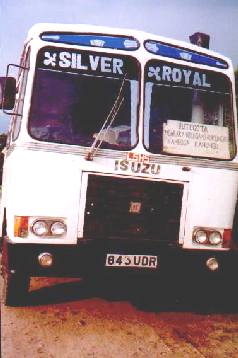 the bus to Butogota
the bus to Butogota
I was the first one to board the 6:30 scheduled bus, and the second
person, who arrived 45 minutes later, was a tourist from Toronto.
"That's kinda like New York," I offered. After all, it was on the same
continent and not too far from home.
"How dare you?" she declared, appalled that a pompous New Yorker would
dare to besmirch her beloved hometown.
"Bitch," I thought.
The bus filled up eventually, and two young Slovenian women filled out
the tourists-off-to-see-the gorillas contingent.
An obnoxious man with a bowl of soup and a portable radio plopped down
next to me.
"To hell with being polite," I thought. "I'm moving." No way was I
going to spend the day next to a staticky transistor radio.
 road to Bwindi
road to Bwindi
The man smiled and followed me to my new seat. He was intent on being
my seatmate for the duration. I should've sat next to the Canadian.
Mr. Charming tuned in -- more or less -- a sappy pop station (the only
option in Uganda save Christian broadcasting) at full blast. He
proceeded to spread his legs wide and poke me with his elbows. Butogota was
only eleven hours away.
The 6:30 bus finally pulled out at 8:45, its occupants half-dead from
inhaling diesel fumes in the bus park. We left the outskirts of
Kampala, passed an empty revival stage, and headed down the paved road into
the depths of Uganda.
 bananas
bananas
The "Silver" bus, like most buses in developing countries, stopped
constantly. Bus stops did not appear to be set -- anyone with a flapping
hand was a potential bus stop. And there were none of those pesky safety
regulations to worry about either -- standing in the aisles was
perfectly acceptable, as was perching in the stairwell or hanging off of the
front door as the bus took off. And at every stop, peddlers would
approach hopefully, plying their trades.
Eventually, more people were standing than sitting. Mr. Charming fell
asleep, and two teenage boys reached over and shut off his radio.
A man got on with a bundle of new bicycle tires, which he stuck next
to my seat. A woman with a baby boarded and perched precariously on top
of the tires until Mr. Charming awoke and -- thankfully -- traded spots
with her. It was almost tolerable to be squashed by a mom and a baby,
whereas it was unpleasant to be squashed by a strange man.
The mom and baby disembarked just before we left the pavement for a
bumpy dirt road. They were replaced by a constant stream of chubby,
middle-aged friendly ladies, all anxious to welcome me to Uganda.
I have heard westerners comment that Africans have bladders of steel,
and I was inclined to agree with them. Buses stop only long enough for
passengers to embark or disembark, never long enough for a pee stop. I
have learned to risk kidney stones and drink nothing on these long bus
rides, but Ugandans seemed to drink anything put in front of them.
"You pray for a flat tire," one British guy in East Africa told me
later, "just so you can pee."
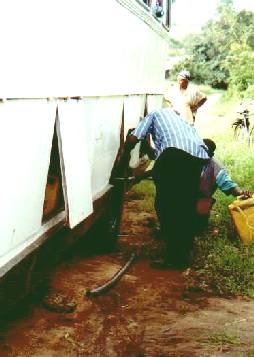 flat du jour
flat du jour
He was right, and fortunately flat tires occurred with astounding
regularity.
Our flat-tire-du-jour occurred in late afternoon, in a rural
semi-village next to a tiny tea shop with a doorless pit toilet out back.
Everyone -- even the Africans -- visited it with relief.
The local children gathered to stare, at the city people as well as
the pale foreigners. One child wore a Green Bay Packers shirt but had no
idea what it meant or why it made me giggle.

I wanted to explain to the kids why us four foreigners were standing
on a dirt road in rural Uganda. I found a photo of mountain gorillas in
my guidebook and showed it to them.
"Ngagi!" shrieked the children, first scattering in fear and then
crowding around for a better look.
Ngagi, according to "Gorillas in the Mist," was the Swahili word for
gorilla. I had read Dian Fossey's book in its entirety on the bus trip,
and wondered if she wasn't perhaps a bit compulsive.
A certain amount of madness, of obsession, is required for
single-minded tasks such as habituating gorillas. But that was okay -- I liked
slightly mad people. What concerned me was Fossey's skepticism about
gorilla tourism. It seems that strangers traipsing up to snap photos and
stare at gorillas can be stressful on out primate relations. Why, I
wondered, was I here if it was stressful on the gorillas (and expensive to
boot)?
The answer is easy. There were 242 ngagi in the mists left in the
early 80's when Dian Fossey started her research. Today there are over six
hundred. This is certainly due to public awareness and support, and
gorilla tourism. Tourism is big business and at $250 hard currency a
visit, plus ancillary income from visas, hotels and transportation, the
mountain gorillas were a cash cow worth protecting.
"Would the mountain gorilla be a species doomed to extinction in the
same century in which it was discovered?" Dian Fossey had asked this
disheartening question in her book. The answer, we now know, is no.

Our flat repaired, we left behind the squealing children and headed
out into the drizzle.
I had planned carefully to avoid rain in Africa but the weather was
off schedule this year. The muddy roads made for slow going but we neared
the outskirts of Butogota around 7:30.
And then our lights cut off. The electricity on the bus shut down
entirely. The road in front of us was pitch black.
Our driver sensibly applied the brakes and didn't steer left or right.
There was no panic, and the bus staff used flashlights to repair the
damaged wire or fuse.
We started up again, with a renewed sense of confidence in our driver
and a better idea of the real safety concerns of using local transport
in poor countries. If the driver hadn't maintained his cook, I realized
that we could have been in a dangerous situation. Two months later, in
Ethiopia, I was to learn just how dangerous.
We finally stopped in Butogota, where a pickup truck waited to take
the Slovenians and I to Bwindi. The Canadian was resting up for a day
before continuing.
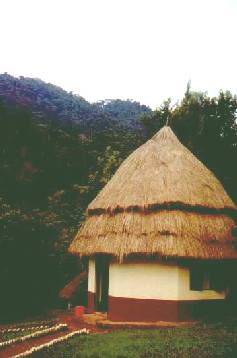 banda
banda
The last seventeen kilometers took forty minutes, and finally,
exhausted, we checked into a cement "banda" at the Community Restcamp. The
friendly staff served us spaghetti by candlelight and gave us a bucket of
water to wash the day's grime from our sweaty bodies.
I caused a minor uproar by refusing to write my home address or
nationality in the register. The murdered tourists in '98 had been Americans
and British nationals.

"Do the gorillas ever come to the camp?" I asked the kid who worked
there.
"Sometimes they come to see us. They wander into the yard. I am sure
that they know me."
The Slovenians and I retreated to our banda. By lantern light, we
locked the door. I was glad there were bars on the windows, and that I
wasn't sleeping in a tent tonight.
BWINDI TO KABALE
OCTOBER 3
I could hear rain pounding on the banda's tin roof. That meant that I
had survived my night in Bwindi Impenetrable Forest.

I opened an eye and squinted at my Timex Indiglo watch. It was five.
Time to open the other eye and get out of bed.
Reading the Dian Fossey book had brought an air of excitement to my
visit, and I now understood that I was going to see a rare and unique
endangered species.
 ready to track gorillas
ready to track gorillas
After breakfast, we paid our National Park fees of fifteen dollars
each and were split into two groups. The Slovenians were off to visit "H"
group, and I was to see "M" group. I was lucky -- traipsing through the
jungle was tough, muddy going and "M" group was currently rumored to be
close to camp.
The Slovenians, however, had a tough day ahead of them. Yesterday's
"H" tracking group had returned after 5 p.m.
I joined what turned out to be a group of five. One woman worked for
Mantana, a Ugandan travel outfitter, and she had her US marketing rep
(http://www.eaiadventure.com) along. A South African woman was single
for the day, as her husband had to split up and go with the "H" trackers.
And the other two -- Jordi and Nuria -- were an adventurous Spanish
couple on a two-week Ugandan holiday.
We all got walking sticks and a briefing.
Luz was our guide. He was accompanied by two expert trackers, three
porters (I carried my own bag), two armed guards, and one Ugandan
university student whose job it was to record precisely everything the
gorillas did. Uganda seemed to have great pride and scholary interest in its
gorillas. Gone were the days of indiscriminate poaching and trapping.
We were to follow along, quiet and non-threatening. If a gorilla
charged us, we were to kneel down on all fours and submissively look at the
ground.
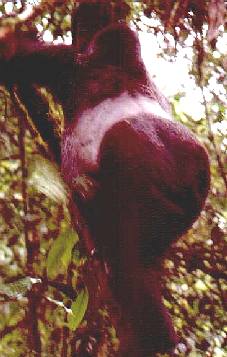 guess what? gorilla butt!
guess what? gorilla butt!
"And pretend to eat grass," I added silently. That was what
cartoonist
Peter Kuper was told to do in Rwanda some years back.
Perhaps the grass-eating had been discredited as overkill, or perhaps
the guides had just gotten tired of being laughed at by tourists. We
were sent off gorilla-tracking without these vital instructions.
We set off down a dirt track. We could hear troops drilling just to
our right, behind some brush. That was the "invisible army" I'd read
about. Rumor had it that Rwanda guards followed the gorillas around
constantly to protect them from Congolese rebels -- modern-day poachers whose
aim was to damage the economy of Rwanda.
Our trackers led us up a the dirt road for ten minutes, then took a
startling right turn into a dense jungle of mud and undergrowth. I
wondered now at the wisdom of not hiring a porter.
It was the "impenetrable" bit of "Bwindi Impenetrable Forest" that
should have tipped me off. The rain, mud, and vegetation was impenetrable
enough, but the massive slopes complicated the trek. I leaned heavily
on my walking stick, poking it into mud and putting all my weight on it
as I propelled myself up jungle hills.
Ex-Dragoman driver Nikki had warned me to bring an old pair of
gardening gloves "as you must sometimes haul yourself along by vines and
roots."
I hadn't brought gardening gloves, and just as I was beginning to
regret it, we started sliding back down hill towards the road.
 hiking through the forest
hiking through the forest
Our uphill escapade had been in vain. The trackers followed the
gorilla trail to the left of the road this time.
Later, I suspected that the trackers had deliberately taken us
off-course, to give us a taste of tracking, so we wouldn't feel cheated at
having missed our chance to wallow in mud.
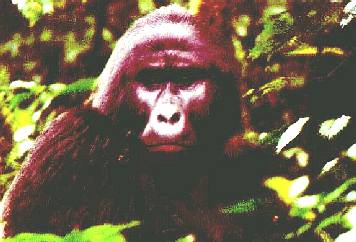
Group "M" was only fifty feet from the road. We all left our sticks
against a tree and got our cameras ready.
"Look, he's mating," said Luz.
Excitedly, we all crowded forward to see the dominant silverback at
work.
"That's it?" I thought. The silverback sat passively, a bored
expression on his face.
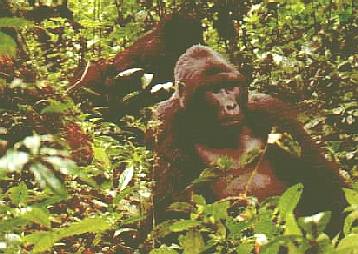
The flattened female gorilla under him looked more like a gorilla-skin
rug than a living breathing mountain gorilla. I'd expected noises or at
least movement. Perhaps we'd just seen the end.
We had. The silverback -- presumably they're named for the silver
stripe adult male mountain gorillas develop -- stood up and casually
strolled away. He seemed to be utterly oblivious to our presence, but more
than likely considered us no threat to his group of twelve.
His name -- which I've forgotten -- meant "sleeps a lot." But
Sleeps-A-Lot didn't sleep today. He posed for a bit, taunting my high-speed
film as I realized that even 1600 was not fast enough for the low light.
Then he joined his family up in the trees, where they searched for
fruit.
We couldn't see much of the gorillas, and I was getting worried. The
permit guaranteed us an hour near the gorillas, but not within sight of
them. If the gorillas chose to stay in the trees for the whole hour,
that was their perogative and our tough luck.
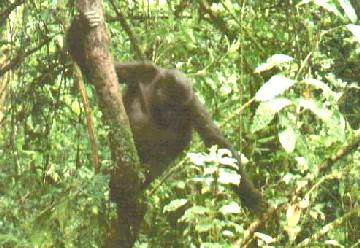
Perhaps, I thought, we couldn't SEE the gorillas, but we could
certainly hear them.
"FZZZZRRTT!" The silverback let one fly.
"BRRRRRZZZT!" So did the female he'd been squashing earlier.
We spent forty minutes listening to gorillas farts.
"Do they always do that?" I whispered to Luz.
He nodded. "They are vegetarian."
Funny, Dian Fossey never mentioned gorillas gas in her novel. Maybe
she was so accustomed to it that it didn't merit so much as a mention.
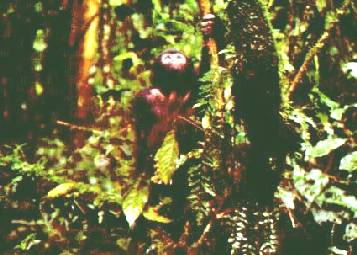
Finally, the gorillas descended. The biggest, Sleeps-A-Lot, was about
half my size and the others were small and squat. Their funny shapes
didn't impede their agility, however. The gorillas -- for the most part
-- gracefully propelled themselves earthwards by using branches and
vines. They seemed to exert no effort at all. A few of them were less
graceful, and nearly plummeted to the ground. It was gorgeous to watch --
twelve fat little apes descending as one.
"It's been one hour," said Luz. Reluctantly, we plowed through the mud
back to the road.
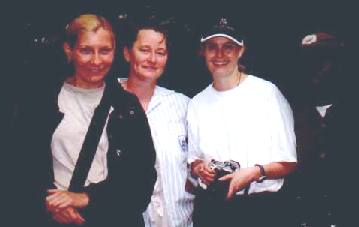 happy gorilla trackers
happy gorilla trackers
My goal was to get to the town of Kabale -- three hours away -- by the
end of the day. If I could get over the difficult mountains now, I'd
only have a six-hour bus ride to Kampala tomorrow.
Jordi and Nuria, fortunately, were headed that way. Their driver
agreed to take me along, and after a quick lunch we headed over the
mountains to Kabale.
The ride was rainy and beautiful, as the bad road wound its way
through the mist past terraces and banana trees. Our driver was safe and
considerate, and made way for the kids, goats, and bicycles on the road.
 local kids
local kids
When we got to Kabale, it was pouring. I offered to stay at the
expensive hotel in town as it was the easiest place to drop me off. But the
driver insisted on taking me to Sky Blue, a cheap and friendly hotel
where I was the only tourist. I had a simple room with a bed and a look,
and there was a hot shower nearby.
KABALE TO NAIROBI
OCTOBER 4
I had to wake the manager to let me out at six a.m., and then had to
sit through the incomprehensible stories told to me by the gun-toting
guard. Eventually, a modern bus came by. I boarded. Everyone left me
alone, and in six hours I was in Kampala, where I boarded the 3 p.m.
overnight bus for Nairobi.
 yet another flat tire
yet another flat tire
NEXT:by balloon over Masai Mara and a week in the terrorist hotel in
Nairobi.